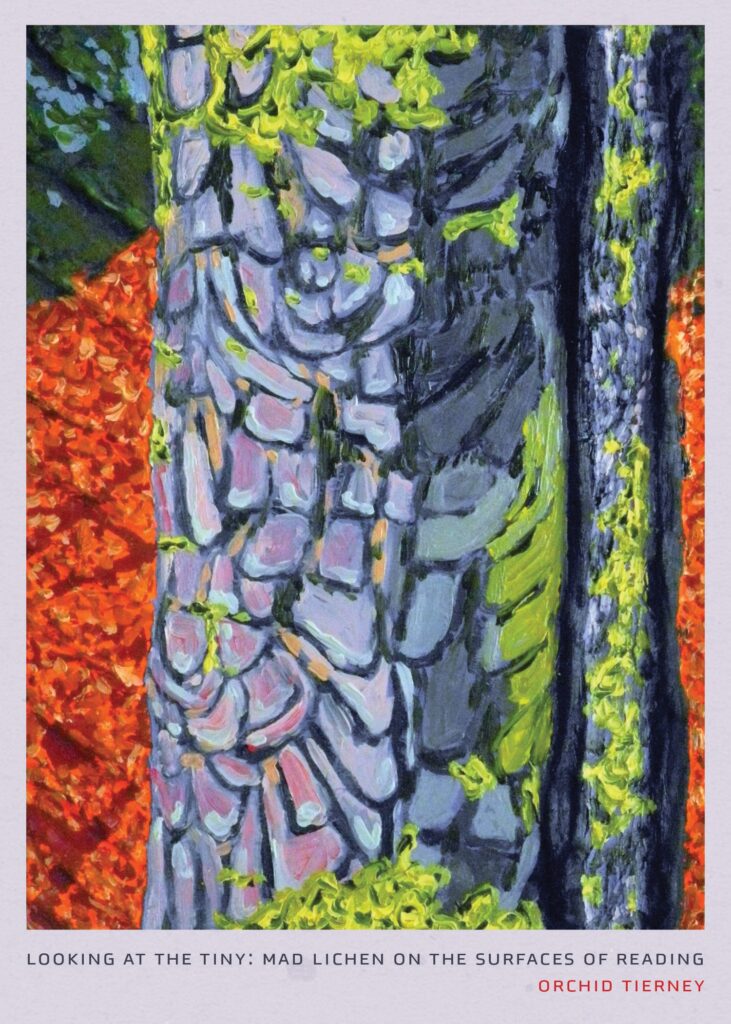
looking at the Tiny: Mad lichen on the surfaces of reading
Orchid Tierney
Traversing across the surfaces of Madness and lichen, looking at the Tiny: Mad lichen on the surfaces of reading pursues the tiny entanglements of life, the weird intimacies of interpretation, and the cosmic complexities in the poem “Springtime in the Rockies, Lichen” by the Beat poet Lew Welch. A troubled figure of his generation, Welch cannot be reduced to fatalism or tragedy. Moving between obscurity and fame, joy and depression, and identity to identity, the poet’s life reveals his fantastic sensitivities suspended in the sharpness of a microscopic imagination. looking at the Tiny takes a creative dive into Welch’s lichen-like brilliance to celebrate the magnetism of the tiny life forms that populate our world.
“we’re not living in the anthropocene. it’s the lichencene. and lichens’ power lies in their surface spreading of small catastrophes.“
“In looking at the Tiny, Orchid Tierney celebrates lichen—that ubiquitous, promiscuous “plural thing” spreading over any available surface. Tierney also writes like lichen, rejecting vertical hierarchies of punctuation and scholarly interrogations in favor of the surface reading, the spontaneous wow! of wonder. Her praxis here is in homage to the Beat poet Lew Welch, whose attention locates cosmological mysteries in the mundane, and often ignored: skunk cabbage, linden tree, lichen. This small book is a manifesto for delight in the given, in the now—of the world and of Welch’s work, independent of his larger biography and “institutional mechanisms of … interpretation.” This is a gift and a reminder: Look. Slow for joy. Say wow.”
— Allison Cobb, author of Plastic: An Autobiography
“Tierney asks “where do we begin? not under the surface but on it.” But what is a surface? Surfaces may be misleading—the surface of language—the surface of thought—surfaces we look past but fail to see. This act of looking, in tierney’s exquisite prose, is encountered newly, brightly, with a sense of wonder not eclipsed by our time in “the toxic scales of the anthropocene.” “lichens are emergent property, a molecular commons, and they have pulled this man with a magnifying glass in his hand towards their urban ‘city of cups.’” looking at the Tiny: Mad lichen on the surfaces of reading follows Lew Welch’s poetic trajectories with a magnetic attention fastened upon the miniscule, the “cosmic creators”—lichen. This book is a curious walk, a delving into a catalogue, a tiny alive archive of intricate architectures. In Tierney’s words we learn that the monumental may indeed be small, a city may be constructed of pin-head cups, a humbling magnificence. Robin Wall Kimmerer writes “We need acts of restoration, not only for our polluted waters and degraded lands, but also for our relationship with the world.” tierney’s composition is such an act of restoration—at once humble, distressed and simultaneously joyful—in this learning to look newly at what we so often fail to see.”
— Laynie Browne, author of Translation of the Lilies Back into Lists
“Orchid Tierney creates a surface of “small gestures” for us to be with, fall through, and lean against in delicate balance and in delicious tumult. She celebrates the “weird ecology of kinship” of the Tiny – mosses and lichens – “little worlds, planetoids on a fallen log” and the Mad—a plurality of identities that don’t coalesce—“where do we begin?” As this plural “we” looks at and feels into the surfaces of the Nebraska morning Tierney wanders through and the spring day in the Rockies of Lew Welch’s poem, there is a prismatic quality of language bumping into time and elements that redirects attention and cultivates wonder in macro and micro ways.”
— Stephanie Heit, author of Psych Murders
“Wow. How can you not read this astute and moving poem-essay that begins “lichen are the tiny collaborators of the forest” and finds elation in “the strangeness of a collective life” be it that of the cross-species alliance that constitutes lichenhood or the writings, joys and struggles of Beat poet Lew Welch. Wonderfully thought. Wonderfully written.”
— Evelyn Reilly, author of Echolocation
ORCHID TIERNEY is a poet and scholar from Aotearoa New Zealand. She is the author of the collection a year of misreading the wildcats (The Operating System, 2019) and six chapbooks including my beatrice (above/ground press, 2020), ocean plastic (BlazeVOX Books, 2019), Gallipoli Diaries (Gauss PDF, 2016), blue doors (Belladonna Press, 2018) brachiation (Gumtree, 2012), the world in small parts (Dancing Girl, 2012). Her scholarship, reviews, and poetry have appeared or are forthcoming in Jacket2, Venti, Fractured Ecologies, Substance, among others. She is the recipient of the Ohio Arts Council Y22 Individual Artist Excellence Award and a Black Earth Institute Fellow for 2022–25. Tierney is an assistant professor of English at Kenyon College and a senior editor at the Kenyon Review.